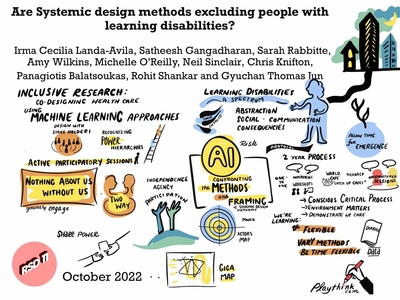Are Systemic Design Methods Excluding People with Learning Disabilities?
Landa-Avila, Cecilia, Gangadharan, Satheesh, Rabbitte, Sarah, Wilkins, Amy, O’Reilly, Michelle, Sinclair, Neil, Knifton, Chris, Balatsoukas, Panos, Shankar, Rohit and Thomas Jun, Gyuchan (2022) Are Systemic Design Methods Excluding People with Learning Disabilities? In: Proceedings of Relating Systems Thinking and Design, RSD11, 3-16 Oct 2022, Brighton, United Kingdom.
Preview |
Text
Landa-Avila_DesignMethods_Paper_2022.pdf - Published Version Available under License Creative Commons Attribution Non-commercial No Derivatives. Download (229kB) | Preview |
![Sketchnote by Patricia Kambitch [thumbnail of Sketchnote by Patricia Kambitch]](https://openresearch.ocadu.ca/4266/1.hassmallThumbnailVersion/Landa-Avila_Sketchnote_2022.jpg)  Preview |
Image (Sketchnote by Patricia Kambitch)
Landa-Avila_Sketchnote_2022.jpg - Published Version Available under License Creative Commons Attribution Non-commercial No Derivatives. Download (642kB) | Preview |
Abstract
This presentation aims to present an inclusive research protocol to enable the participation of people with learning disabilities to codesign Artificial Intelligence healthcare systems scenarios and reflect on how some groups of populations have been excluded while participatory systems thinking approaches/methods have been conceptualised and applied.
A succinct review of systems thinking methods (i.e., systems mapping, ecosystems scenarios and patients’ journeys) will be presented and reflect on how inclusive they are. Next, the protocol followed in an ongoing project that explores the integration of Artificial Intelligence for codesigning a joined-up healthcare model for people with learning disabilities will be presented. This protocol describes a methodology that introduces and adjusts some systems thinking methods to meet the needs of people with learning disabilities to become active participants in sessions with multiple stakeholders (e.g., health and social care professionals, policymakers and tech innovators, among others). The presentation will emphasise the ethical considerations for recruitment and consent, adjustments for reducing the cognitive workload of methods, environmental aspects to ensure participants’ wellbeing, follow-up actions for long-term engagement and meaningful contributions and building up learnings to increase ‘complexity’ and independence.
The presentation will conclude with a reflection on how these adjustments and considerations could be adopted in other approaches, methods and techniques to demystify the complexity of systems thinking methods and contribute to enabling more inclusive research practices. This inclusive perspective promotes the integration of diverse actors, especially those that have remained excluded from the mainstream methodological approaches to achieve genuine participation within a systems thinking approach
| Item Type: | Conference/Workshop Item (Paper) |
|---|---|
| Uncontrolled Keywords: | inclusive systemic design, multistakeholder participation, healthcare scenarios, artificial intelligence, AI |
| Divisions: | Faculty of Design |
| Date Deposited: | 04 Apr 2024 14:39 |
| Last Modified: | 04 Apr 2024 14:39 |
| URI: | https://openresearch.ocadu.ca/id/eprint/4266 |
Actions (login required)
 |
Edit View |

 Lists
Lists Lists
Lists